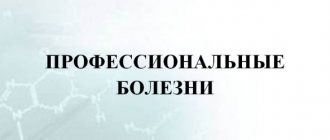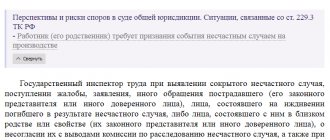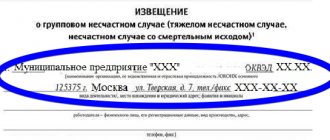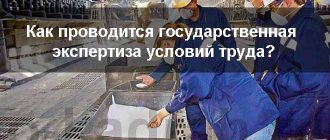Article 227 of the Labor Code lists accidents that must be investigated and taken into account.
It concerns persons injured as a result of performing labor actions required for them. Labor Code of the Russian Federation
dated December 30, 2001 N 197-FZ
Full text of the article, guides, additional information - in ConsultantPlus
General points
According to the Labor Code of the Russian Federation and the regulations on the specifics of investigating industrial accidents in certain industries and organizations, it is necessary to investigate industrial accidents. These legal acts establish the procedure for investigating and recording ERP in production. It is undoubtedly mandatory for all organizations, regardless of their organizational and legal form, as well as for persons engaged in entrepreneurial activities without forming a legal entity and using hired labor.
Cases related to many factors are subject to investigation. If you participate in the employer’s production activities, as well as when carrying out other lawful actions determined by the employment relationship with the employer or performed in his interests.
Characteristics of Art. 227 TK
Accidents that occur with the following groups involved in the economic activities of the employer and/or carrying out instructions for his needs are subject to investigation and recording:
- employees;
- other persons (including those subject to social insurance against accidents and occupational diseases).
The group of others includes persons:
- students studying on the basis of a student agreement;
- in production practice;
- with mental disorders, workers in occupational therapy;
- those sentenced to imprisonment and involved in work;
- involved in socially useful activities;
- who are participants in cooperatives and farms and who personally work in these structures.
Situations that can be investigated as accidents are described separately:
- injuries, incl. caused by another subject;
- heat stroke, electric shock, etc.;
- bites and their analogues from the surrounding fauna;
- damage due to explosions and other situations classified as emergencies;
- other injuries received due to external factors and resulting in the forced transfer of the injured person to another position or loss of working capacity in a temporary or permanent form (including his death).
It is emphasized that these events fall under Art. 227 if they occurred during:
- working day on the employer’s premises or in another similar place, incl. during the employee's required breaks;
- equipment care and other actions mentioned in the internal regulations;
- performing assigned work outside the normal work schedule;
- traveling to or from work using transport provided by the employer, or using your own transport, but used for work purposes as directed by the relevant manager or by special agreement;
- directions to the purpose of a business trip and back;
- business trips using a variety of transport;
- following the instructions of the relevant manager to the place of work (executing a business order) and back, incl. under its own power;
- travel by transport as a shift worker during rest between shifts;
- working on a rotational basis during rest between shifts, as well as while on ships during free time from the watch and ship work;
- performing other correct actions based on a working relationship with the employer or aimed at protecting his interests, incl. to prevent emergency situations.
The conclusion states that under Art. 227 also include the situations listed in its third part if they occur with unauthorized persons involved in the appropriate manner for activities to prevent emergency situations or eliminate their results.
What industrial accidents are subject to investigation?
The injuries that may lead to an investigation are very extensive. First of all, physical injuries are taken into account. Of course, heatstroke, burns or frostbite are also subject to investigation. Probably the most unusual cases are lightning or electric shock. Drowning is also a fairly rare traumatic industrial drying. It should also be noted that Damage due to explosions, accidents, destruction of buildings, structures and structures, natural disasters and other emergency circumstances are taken into account in the general manner. Other health injuries are regulated in accordance with the general procedure. A complete list of hazardous situations can be found in the Labor Code.
Accidents subject to investigation
An industrial accident in accordance with Article 3 of the Law of July 24, 1998 No. 125-FZ is recognized as an event as a result of which the insured person received injury or other damage to health during the performance of his duties under an employment agreement (contract) and as otherwise established by this Federal Law cases, both on the territory of the insured and beyond, or while traveling to the place of work or returning from the place of work on transport provided by the insured, and which entailed the need to transfer the insured to another job, temporary or permanent loss of professional ability or his death.
In accordance with Article 227 of the Labor Code of the Russian Federation (hereinafter referred to as the Labor Code of the Russian Federation), the following cases that entail the need to transfer the employee to another job, temporary or permanent loss of ability to work, or the death of the employee are investigated and subject to recording as industrial accidents:
- injury, including that caused by another person;
- acute poisoning;
- heatstroke;
- burn;
- frostbite;
- drowning;
- electric shock, lightning, radiation;
- insect and reptile bites, bodily injuries caused by animals;
- damage resulting from explosions, accidents, destruction of buildings, structures and structures, natural disasters and other emergency situations.
The above accidents are subject to investigation if they occur:
- during working hours on the territory of the organization or outside it (including during established breaks), as well as during the time necessary to put production tools and clothing in order before starting and after finishing work, or when performing work overtime, weekends and public holidays;
- when traveling to or from work on transport provided by the employer (his representative), or on personal transport in the case of using the specified transport for production purposes by order of the employer (his representative) or by agreement of the parties to the employment contract;
- when traveling to and from a business trip;
- when traveling on a vehicle as a shift worker during a rest period between shifts (shift driver on a vehicle, conductor or mechanic of the refrigerated section on a train, and others);
- when working on a rotational basis during rest periods between shifts, as well as when being on the ship during free time from the watch and ship work;
- when involving an employee in the prescribed manner to participate in the liquidation of the consequences of a disaster, accident and other emergencies of a natural and man-made nature;
- when carrying out actions that are not part of the employee’s job duties, but are performed in the interests of the employer (his representative) or aimed at preventing an accident or accident.
According to Article 227 of the Labor Code of the Russian Federation, industrial accidents that occur with employees and other persons, including those subject to compulsory social insurance against industrial accidents and occupational diseases during the performance of their labor duties and work on the instructions of an organization or an individual employer, are subject to investigation and recording. faces. These persons include:
- employees performing work under an employment contract;
- students of educational institutions of higher and secondary vocational education, students of educational institutions of secondary, primary vocational education and educational institutions of basic general education, undergoing practical training in organizations;
- persons sentenced to imprisonment and attracted to work by the administration of the organization;
- other persons participating in the production activities of an organization or individual entrepreneur.
To other persons in accordance with Appendix No. 2 “Regulations on the peculiarities of the investigation of industrial accidents in certain industries and organizations” to the Resolution of the Ministry of Labor and Social Development of the Russian Federation of October 24, 2002 No. 73 “On approval of the forms of documents necessary for the investigation and recording of accidents cases at work, and provisions on the specifics of investigating accidents at work in certain industries and organizations" include:
- military personnel, students and pupils of educational institutions of the appropriate level, sent to organizations to perform construction, agricultural and other work not related to military service or the educational process;
- family members of employers - individuals (heads of peasant farms), members of cooperatives, participants in business partnerships or other societies working for them (in them) on their own account;
- members of boards of directors (supervisory boards) of organizations, bankruptcy and external managers; citizens involved by decision of the competent authority to perform public works or events of a civil nature;
- employees of third-party organizations sent by agreement between employers in order to provide practical assistance on issues of organizing production;
- persons undergoing scientific, pedagogical and scientific training in the system of postgraduate professional education (postgraduate students and doctoral students);
- employees undergoing on-the-job retraining on the basis of an apprenticeship agreement concluded with the employer;
- mentally ill people receiving treatment in psychiatric (psychoneurological) institutions, involved in work as occupational therapy in accordance with medical recommendations.
By Decree of the President of the Russian Federation of March 9, 2004 No. 314 “On the system and structure of federal executive bodies,” the Ministry of Labor and Social Development of the Russian Federation was abolished. The Federal Service for Labor and Employment was formed, to which law enforcement functions, control and supervision functions and functions for the provision of public services of the abolished Ministry of Labor and Social Development of the Russian Federation were transferred.
Comments on the article
One of the main directions of state policy in the field of labor protection is the investigation and recording of industrial accidents and occupational diseases (Article 210 of the Labor Code). The results of the investigation, drawn up in accordance with the requirements of the law, serve as a basis for the protection of the legitimate interests of workers affected by accidents at work, as well as members of their families under the compulsory social insurance against accidents at work and occupational diseases (see commentary to Article 184 ) or in civil law at the expense of the tortfeasor.
An industrial accident is an event as a result of which an employee or other person involved in the production activities of the employer, while performing their job duties or performing any work on behalf of the employer (his representative), as well as when carrying out other lawful actions due to labor relations with the employer or committed in his interests, received: bodily injuries (injuries); heatstroke; burn; frostbite; drowning; electric shock, lightning, radiation; bites and other bodily injuries caused by animals and insects; damage due to explosions, accidents, destruction of buildings, structures and structures, natural disasters and other emergency circumstances, other health damage caused by external factors, resulting in the need to transfer the victim to another job, temporary or permanent loss of ability to work, or his death.
Part 1 of the commented article defines the circle of persons whose accidents are subject to investigation and recording. Such persons include employees and other persons participating in the production activities of the employer.
Part 2 of Art. 227, persons participating in the employer’s production activities, in addition to employees performing their duties under an employment contract, include: employees and other persons receiving education in accordance with an apprenticeship contract; trainees undergoing practical training; persons suffering from mental disorders who participate in productive work at medical and industrial enterprises in the form of occupational therapy in accordance with medical recommendations; persons sentenced to imprisonment and forced to work; persons involved in the prescribed manner to perform socially useful works; members of production cooperatives and members of peasant (farm) households, taking personal labor participation in their activities.
Accidents involving persons working under a civil contract are also subject to investigation and recording, as those performing work on behalf of the employer, an individual or legal entity (Part 1, Article 227). For individual entrepreneurs who do not employ the labor of other workers, the provisions of Art. 227 do not apply.
In addition, as follows from Part 4 of Art. 227, the events specified in Part 3 of Art. are also subject to investigation as accidents. 227, if they occurred with persons involved in the prescribed manner in the work to prevent a catastrophe, accident or other emergency circumstances or in the work to eliminate their consequences.
When a state of emergency is introduced, in exceptional cases related to the need to carry out and ensure emergency rescue and other urgent work, the mobilization of the working population and the involvement of citizens' vehicles to carry out the specified work with mandatory compliance with labor protection requirements (clause “e” of Art. . Law on State of Emergency). Guarantees of property and social rights of citizens and organizations during a state of emergency are provided for in Art. of the said Law.
As can be seen from the provisions of Art. 212 of the Labor Code, in addition to industrial accidents, occupational diseases are also subject to investigation and recording - chronic or acute diseases (poisonings) of workers resulting from exposure to harmful production factors and resulting in temporary or permanent loss of their professional ability to work. The procedure for investigating and recording occupational diseases is established by the Regulations on the investigation and recording of occupational diseases, approved. Decree of the Government of the Russian Federation dated December 15, 2000 N 967.
Occupational accidents or occupational diseases that occur to employees who are subject to compulsory social insurance against industrial accidents and occupational diseases are insured events that give rise to corresponding obligations of the insurer.
Issues regarding recognition of an accident as an insured event are complex and often become the subject of consideration by higher courts. Thus, the Presidium of the Supreme Arbitration Court of the Russian Federation, canceling the decision of the Moscow Arbitration Court dated October 26, 2009, the Resolution of the Ninth Arbitration Court of Appeal dated January 25, 2010 and the Resolution of the Federal Arbitration Court of the Moscow District dated April 30, 2010 in the case on the application of the Central Bank of the Russian Federation represented by the Central Vault of the Bank Russia on recognizing as illegal the actions of the State institution - the Moscow regional branch of the Social Insurance Fund of the Russian Federation for not recognizing as an insured event an industrial accident that occurred with the employee Knyazev I.S., pointed out that when considering this case for qualifying an industrial accident as an insured all that matters is that the event as a result of which the insured suffered damage to health occurred during working hours and in connection with the performance by the insured of actions determined by the employment relationship with the employer or performed in his interests. The establishment of other circumstances for recognition of such a case by the insurance legislation of the Russian Federation is not provided for (see Resolution of the Presidium of the Supreme Arbitration Court of the Russian Federation dated December 28, 2010 N 11775/10 in case N A40-101647/09-119-757).
For coverage in connection with industrial accidents or occupational diseases, see the commentary. to Art. 184.
In accordance with Art. 214 of the Labor Code, an employee is obliged to immediately notify his immediate or superior manager about any situation, threat to the life and health of people, about every accident that occurs at work, or about a deterioration in his health, incl. about the manifestation of signs of acute occupational disease (poisoning).




